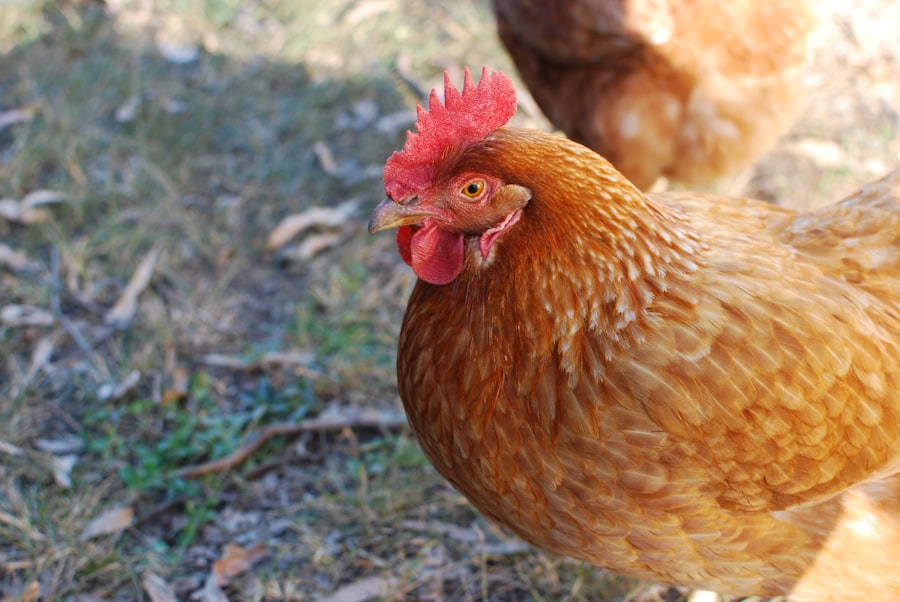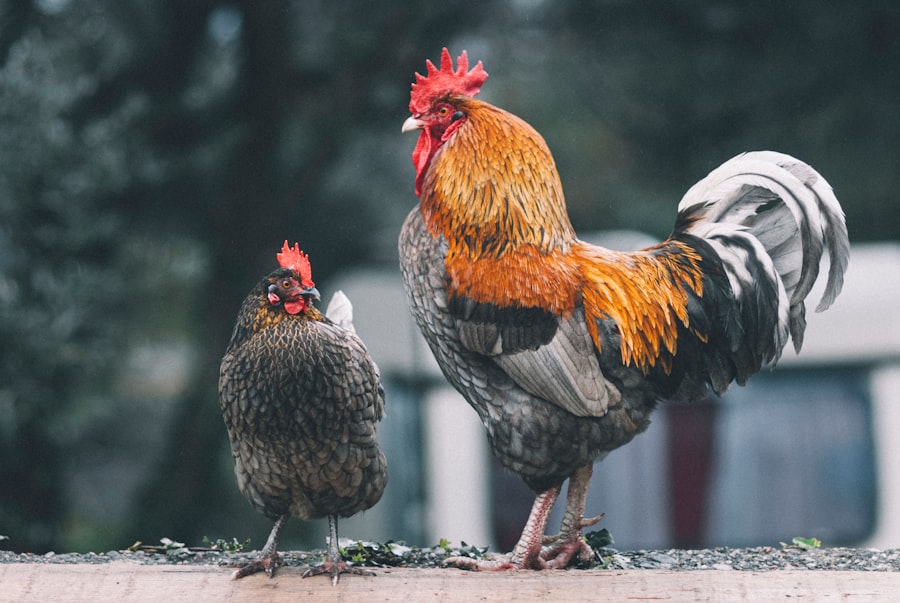Chickens are inquisitive and adaptable birds with a strong drive to forage for food. They naturally seek out insects, seeds, and other edible items, often leading them to explore gardens and flower beds. While chickens are not known for sustained flight, they can fly short distances and may attempt to clear low barriers.
Their social nature means that if one chicken finds a way into a restricted area, others may follow. Chicken behavior includes scratching at the ground to uncover food, which can damage plants and disturb soil in gardens. This habit can be particularly problematic in confined spaces where chickens have limited areas to explore.
Their scratching can uproot plants and disrupt garden beds. When designing a garden fence to exclude chickens, it is essential to consider these natural behaviors. An effective chicken-proof fence must account for their foraging instincts, limited flying abilities, social tendencies, and scratching habits.
Understanding these characteristics allows gardeners to create barriers that successfully prevent chickens from accessing and potentially damaging their cultivated areas.
Table of Contents
- 1 Choosing the Right Height for Your Garden Fence
- 2 Factors to Consider When Determining Fence Height
- 3 Different Types of Garden Fences for Keeping Chickens Out
- 4 Tips for Installing and Maintaining a Chicken-Proof Garden Fence
- 5 Alternatives to Traditional Fencing for Keeping Chickens Out
- 6 Finding the Best Solution for Your Garden
- 7 FAQs
- 7.1 What is the recommended height for a garden fence to keep chickens out?
- 7.2 Why is it important to keep chickens out of the garden?
- 7.3 What are some effective ways to prevent chickens from getting into the garden?
- 7.4 Are there any regulations or restrictions on the height of garden fences for keeping chickens out?
Key Takeaways
- Chickens are naturally curious and will explore their surroundings, including gardens, in search of food and entertainment.
- The height of your garden fence should be at least 6 feet to effectively keep chickens out and prevent them from flying over.
- Factors to consider when determining fence height include the size and breed of your chickens, as well as the presence of other predators in your area.
- There are different types of garden fences, such as wire mesh, electric, and netting, that can be used to keep chickens out of your garden.
- When installing a chicken-proof garden fence, make sure to bury the bottom of the fence to prevent chickens from digging underneath, and regularly inspect and maintain the fence to ensure its effectiveness.
Choosing the Right Height for Your Garden Fence
Fence Height Considerations
For most standard chicken breeds, a fence that is at least 6 feet tall should be sufficient to keep them out of your garden. However, if you have particularly agile or determined chickens, you may need to consider a taller fence or additional measures such as netting or overhead coverage.
Fence Design and Construction
It’s important to consider not only the height of the fence, but also its overall design and construction. A solid fence that is difficult for chickens to see through may be more effective at deterring them from attempting to access your garden.
Fence Materials and Durability
Additionally, the materials used in the construction of the fence can impact its effectiveness. For example, a metal or wire fence may be more durable and long-lasting than a wooden fence, which could be susceptible to damage from scratching and pecking.
Factors to Consider When Determining Fence Height

When determining the height of your garden fence, there are several factors to consider in order to effectively keep chickens out. Firstly, consider the breed and size of your chickens. Larger breeds may require a taller fence to prevent them from hopping over or reaching over the top.
Additionally, consider the age and health of your chickens. Younger or older chickens may have different physical abilities and limitations that should be taken into account when designing your fence. Another important factor to consider is the layout of your garden and the potential entry points for chickens.
If your garden is surrounded by other structures or trees that chickens could use to gain access, you may need to consider additional measures such as netting or barriers to prevent them from finding alternative routes into your garden. It’s also important to consider the potential for predators in your area, as a taller fence may provide added protection for your garden against both chickens and other wildlife.
Different Types of Garden Fences for Keeping Chickens Out
There are several different types of garden fences that can be effective at keeping chickens out of your garden. One popular option is a wire or mesh fence, which can be installed at varying heights depending on the specific needs of your garden and the behavior of your chickens. Wire or mesh fences are durable and can be effective at preventing chickens from scratching or pecking their way through.
Another option is an electric fence, which can provide a strong deterrent for chickens and other wildlife. Electric fences can be particularly effective in areas where traditional fencing may not be practical or where there is a high risk of predators. Additionally, electric fences can be customized to fit the specific needs of your garden and can be easily adjusted to accommodate changes in chicken behavior or population.
Tips for Installing and Maintaining a Chicken-Proof Garden Fence
When installing a chicken-proof garden fence, there are several tips to keep in mind in order to ensure its effectiveness and longevity. Firstly, ensure that the fence is securely anchored into the ground to prevent chickens from digging underneath or pushing their way through. Additionally, regularly inspect the fence for any signs of wear or damage, particularly in areas where chickens may attempt to scratch or peck their way through.
It’s also important to consider adding additional measures such as netting or overhead coverage to prevent chickens from flying over the top of the fence. This can be particularly important for smaller or more agile breeds of chickens that may attempt to escape by hopping over the top of the fence. Finally, consider incorporating deterrents such as motion-activated sprinklers or noise devices to further discourage chickens from attempting to access your garden.
Alternatives to Traditional Fencing for Keeping Chickens Out

Designated Free-Range Areas
In addition to traditional fencing, creating designated free-range areas for your chickens is a great way to keep them out of your garden. By providing ample space and resources for your chickens in their own designated area, you can reduce their motivation to access your garden in search of food and entertainment.
Natural Barriers
Another alternative is to use natural barriers such as hedges or shrubs to create a physical barrier between your garden and your chickens’ roaming area. This can be an effective way to create a visually appealing and natural deterrent for chickens while also adding beauty and diversity to your garden space.
Benefits of Alternative Methods
These alternative methods not only keep your chickens out of your garden but also provide a more humane and environmentally friendly approach to chicken-keeping. By giving your chickens their own space and using natural barriers, you can create a harmonious and thriving ecosystem in your backyard.
Finding the Best Solution for Your Garden
In conclusion, keeping chickens out of your garden requires careful consideration of their natural behaviors and abilities, as well as the specific layout and needs of your garden space. By choosing the right height and type of fence, as well as incorporating additional measures such as netting or deterrents, you can effectively protect your garden from potential damage caused by chickens. Additionally, considering alternative methods such as designated free-range areas or natural barriers can provide long-term solutions for keeping chickens out of your garden while also promoting their health and well-being.
Ultimately, finding the best solution for your garden will depend on a combination of factors including the breed and behavior of your chickens, the layout of your garden, and your own personal preferences and priorities as a gardener.
If you’re considering keeping chickens in your garden, you may also want to think about how to keep them safe from other animals. One important consideration is the height of your garden fence. According to Poultry Wizard, a garden fence should be at least 6 feet high to keep chickens out. This will help to protect them from predators and ensure they stay safe and secure in their coop.
FAQs
What is the recommended height for a garden fence to keep chickens out?
The recommended height for a garden fence to keep chickens out is at least 6 feet tall. This height is effective in preventing chickens from flying over the fence and accessing the garden.
Why is it important to keep chickens out of the garden?
Chickens can cause damage to plants, flowers, and vegetables in the garden by scratching and pecking. Keeping them out of the garden helps protect the plants and maintain the garden’s aesthetics.
What are some effective ways to prevent chickens from getting into the garden?
In addition to a tall fence, other effective ways to prevent chickens from getting into the garden include using chicken wire or hardware cloth to create a barrier, installing a motion-activated sprinkler system, and using natural deterrents such as citrus peels or cayenne pepper.
Are there any regulations or restrictions on the height of garden fences for keeping chickens out?
Regulations and restrictions on the height of garden fences may vary depending on local zoning laws and homeowners’ association rules. It is important to check with local authorities and review any applicable regulations before installing a garden fence.
Meet Walter, the feathered-friend fanatic of Florida! Nestled in the sunshine state, Walter struts through life with his feathered companions, clucking his way to happiness. With a coop that’s fancier than a five-star hotel, he’s the Don Juan of the chicken world. When he’s not teaching his hens to do the cha-cha, you’ll find him in a heated debate with his prized rooster, Sir Clucks-a-Lot. Walter’s poultry passion is no yolk; he’s the sunny-side-up guy you never knew you needed in your flock of friends!







